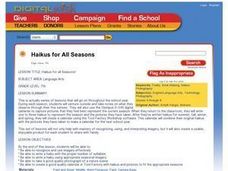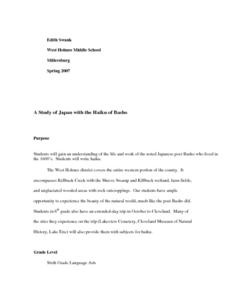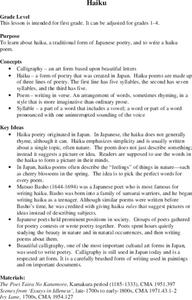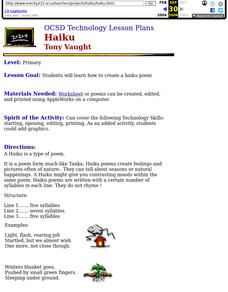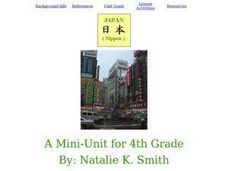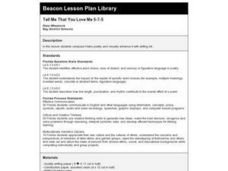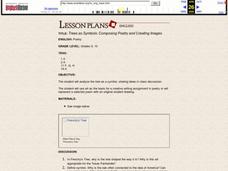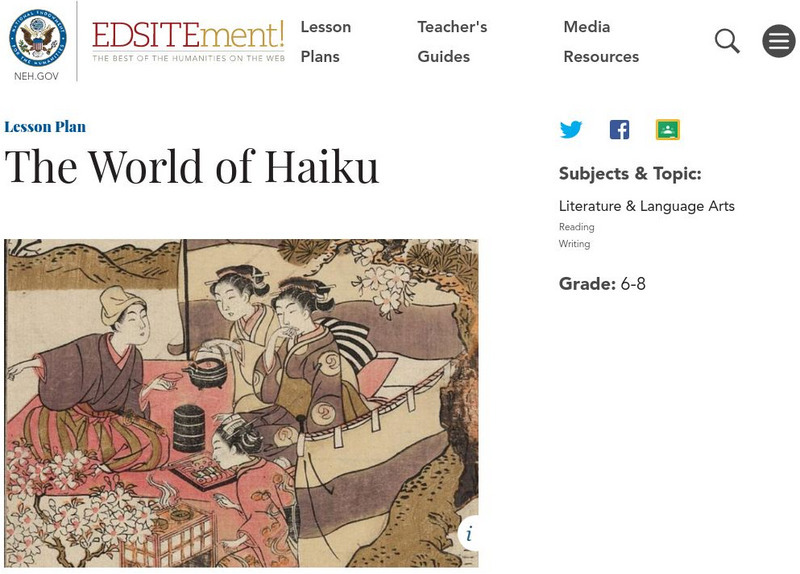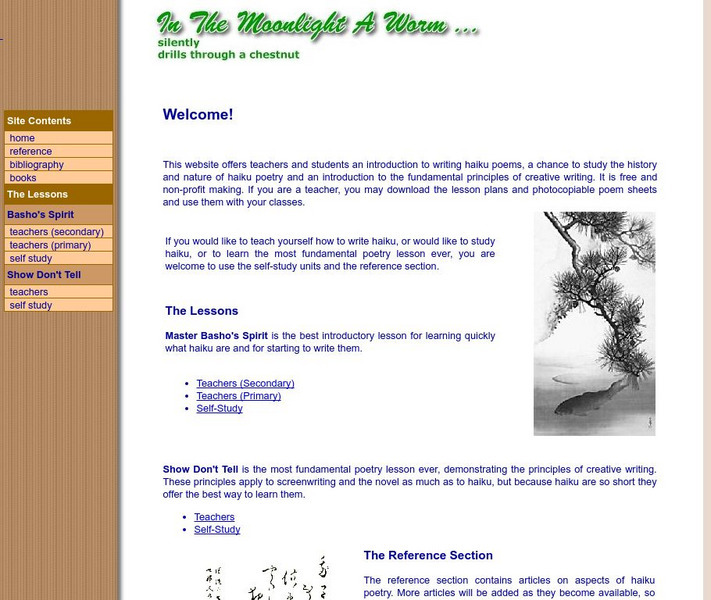Curated OER
Haikus for All Seasons
Students venture outside and take notes on what they observe through their five senses. They use the Olympus D-545 digital cameras to capture pictures that they feel best represent the current season. Students write one to the three...
Curated OER
Five Simple Poems
Students listen as the teacher explains what poetry is as well as describes several types of poetry such as haiku, free verse, limerick, cinquain, and an acrostic. Students read examples of each type of poetry. They compose a poem...
Curated OER
A Study of Japan with the Haiku of Basho
Sixth graders explore haiku poetry and the works of the Japanese poet Basho. They review characteristics of haiku poetry and other forms of poetry. After they write three or more haiku poems, they illustrate one of them and share with...
Curated OER
Poet-Tree (or shrub or forb)
Students write poetry to describe a noxious weed. They form a personal relationship with, and a better comprehension of weeds. Students explain what the basic elements of a haiku are. They describe a particular weed, and comprehend...
Curated OER
Raptor Poetry
Students create poems about raptors. They discuss raptors and create three poems including at least two of the following: haiku, diamante, found, and acrostic. They create a classroom book of poems or conduct a poetry slam where students...
Curated OER
Nature and Haiku Poetry
Students compose haiku poems and recognize how cultures value nature and
natural forces through the study of Japanese poetry. This lesson includes a bibliography of resources.
Curated OER
Haiku
Students work collaboratively to create a class Haiku and illustrate the poem individually in this elementary school lesson. The lesson includes five possible enrichment activities.
Curated OER
The Relationship Between Zen And Haiku Aesthetics
Students examine the principles of Haiku as they relate to idealss found in Zen Buddhism in this High School lesson. The lesson concludes with the creation of individual haikus by each student.
Curated OER
Haiku
Students discuss haiku poems and how they are written with a certain number of syllables in each line. They look at examples and then write their own haiku poems and publish them on the computer.
Curated OER
Social Studies: Exploring Japan
Fourth graders examine the culture and environment of Japan, beginning with a KWL chart. They use clay and cups of water to construct representations of the Japanese Islands. After designing flags representing farming and food, 4th...
Curated OER
"Encounter with a Skull" by Koda Rohan
Students, in pairs, develop two poems--one must be a haiku, the other must be a tanka. They recite their poems to the class.
Curated OER
Narrow Road to the Interior
Students investigate the life and work of the Japanese poet, Matsuo Basho as the Japanese poetic forms are studied. Nature, symbolism, and history are probed as the lesson is developed.
Curated OER
Land of the Rising Sun
Students survey aspects of traditional and modern Japanese customs and beliefs in the seven lessons of this unit. Both the culture and the geography of the country are studied in this unit.
Curated OER
Hawaii
Third graders explore how to do research on the Internet. After they have completed looking up information they create a haiku.
Curated OER
Tell Me That You Love Me 5-7-5
Students listen to several examples of Haiku poetry and discuss the strict format. Then students create and edit their own Haiku poems and enhance them with ink designs.
Curated OER
Trees as Symbols: Composing Poetry and Creating Images
Young scholars analyze the tree as a symbol, sharing ideas in class discussion. They use art as the basis for a creative writing assignment in poetry or represent a selected poem with an original student drawing.
Curated OER
Freddie the Fungus:A Play about Decomposers (Elementary, Computer)
First the class learns how to write a Haiku poem. Then, they use kidpix to illustrate their poem.
John F. Kennedy Center
The Kennedy Center: Lesson: You Too Can Haiku
Here's a creative lesson for students to examine various haikus, and Japanese culture, then write their own haiku poem, and illustrate it using watercolors! Provides plenty of links to more information, a thorough explanation of the...
National Endowment for the Humanities
Neh: Edsit Ement: The World of Haiku
A productive, technologically relevant site that provides a lesson plan on the Japanese Haiku. Complete with educational objectives and extensive student-centered lesson development.
National Endowment for the Humanities
Neh: Edsit Ement: Japanese Poetry Tanka? You're Welcome
A poem "which expresses a personal response to nature," the tanka is a form of Japanese writing very similar to the haiku. This lesson plan is a great extension to any study or exploration of Japanese art, culture, and writing. Included...
PBS
Pbs Learning Media: Selected Haiku by Issa
Learn more about the Japanese form of poetry known as haiku. In this video segment from Poetry Everywhere, the poet Robert Hass reads a short collection of amusing, often ironic haiku by Japanese poet Kobayashi Issa. [1:32]
Huntington Library
Huntington Library: Garden Lesson Plans: Japanese Garden Vocabulary: Haiku [Pdf]
A mini-unit on haiku where students learn about and write haiku inspired by Japanese gardens. This activity is intended to be done in conjunction with a visit to a Japanese garden, but this is not essential.
Other
In the Moonlight a Worm Haiku Homepage
Learn the form, inspiration and spirit of haiku poetry and learn to write it yourself. An in-depth discussion of the philosophy behind haiku, as well as the literary structure.
ReadWriteThink
Read Write Think: Reading, Writing, Haiku Hiking! Class Book of Picturesque Poems
Contains plans for five lessons about haiku using "One Leaf Rides the Wind" by Celeste Davidson Mannis as an introduction and model. In addition to objectives and standards, these instructional plans contain links to sites used in the...


